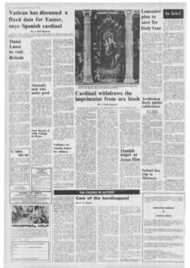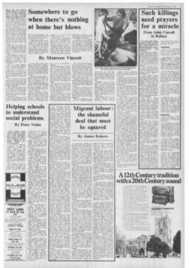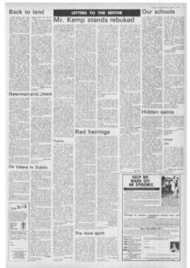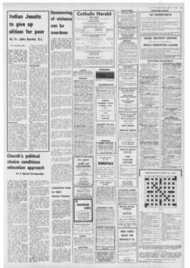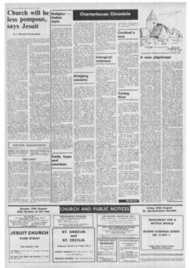Page 5, 17th August 1973
Page 5

Report an error
Noticed an error on this page?If you've noticed an error in this article please click here to report it.
Tags
Share
Related articles
Over To Fr. Agnellus Andrew
The Lunn Coulton Book
Herald Praised For Coverage Of Controversy
Charterhouse Chronicle
H. G. Wells Writes To Us
Mr. Kemp stands rebuked
LETTERS TO THE EDITOR
In your issue of August 10 J. Kemp asks you to invite me to write for you. You have kindly done so and soon I shall write for the Catholic Herald about the communications activities of the Church. In the meantime I would like to try to reply to some of his questions.
World Communications Day was decreed by the Second Vatican Council. Two documents were later issued by the Vatican formally promulgating the Day and giving directions as to how it should he kept. The purposes were stated as being to call attention to the place of the Mass Media in contemporary life: to organise prayer for communications and in particular for the Church's work: to get financial support for the Church's own media work.
The collection is mentioned both in the original decree (Art.18) and in the two following documents where it is laid down that the main purpose of the collection is to subsidise the National Centres in each country: but a strong plea is added that help should be given to the Church's media work in missionary countries. All these purposes we have faithfully tried to accomplish. Each year as soon as the material arrived from Rome we carefully prepared suggestions for the liturgy of the day: notes for the sermon or instruction: suggested prayers of the faithful: a report on the past year's work and an account of how the money is spent. For the past two years this has taken the form of an 8-page leaflet. And all this material was sent to every parish in England and Wales.
The annual collection meets the running costs of the week, though we have occasional groups who "meet the media" over a weekend.
For the past three weeks we have had 13 students (six priests, including a Head of Department of Vatican Radio: three clerical students: three laymen: and one nun). Next week we have a group of priests from Birmingham on a Pastoral Communications Course: the following week we have students from the English College, Rome: and then a series of courses preparing for local commercial radio.
Why not have them trained at the BBC? Because in this country the BBC does not provide training except for its own staff. They have occasional courses for overseas students, only from accredited broadcasting organisations and recommended by local British Government agencies. It was to these courses that Miss Vincent's figure referred. So far from the BBC accepting our students, the BBC came to us last year for three courses for some of their religious broadcasters and several times for experimental work in our studios. The need for training is so great that since we began a Methodist foundation has opened its own new Centre (estimated costs about £100,000 per year) and another great religious group is now considering a Centre at an annual cost of £80,000. We ourselves cannot keep pace with the demands on us.
Training is by no means our only activity. Some examples. Over 30 tapes on religious and National Catholic Radio and Television Centre: in addition funds go to the Catholic Information Office: to the National Commission for the Mass Media and its various subcommittees and working parties: to buy equipment for both the Centre and the Catholic Information Office: and a large contribution is made each year to helping the missionary countries, often on the direct advice of the Holy See. Once only the collection has reached £50,000; the average is much lower.
Mr. Kemp raises a question about the work of the Centre.Training was given last year to 305 students: and so far this year we have had 174 students. The longest course is ten weeks: the shortest is one moral subjects have been made here for use in senior schools. We have made a film on the English Martyrs and another 14hours long for the Catholic Marriage Advisory Council.
Programmes are regularly made here for Radio London. And there are endless demands for advice and help from all over the world. We have many meetings and conferences. We are the headquarters of the National Mass Media Commission, which, incidentally, has a majority of lay members, mostly working professionals and the same is true of the staff of the Centre and the Information Office.
As to the quality of the work, apart from the witness of the many hundreds who have studied communications here, including 35 of our own bishops, the fact that the BBC uses us frequently and provides visiting tutors and lecturers regularly, is perhaps the best testimony. After a course, a bishop in a recent letter mentions another dimension: "I enjoyed Hatch End. It has the spirit of St. Francis about it. From the Mass we celebrated together each morning to the Salve we sang so meditatively at night, each day was a spiritual occasion, I do not say this lightly: my week at Hatch End was the sort of spiritual experience all Retreats should be and seldom are."
In addition to the basic training work here, we encourage suitable candidates, priests and others, to take degrees in communication in the various universities and colleges and we would be glad to see suitably qualified priests sharing in the admirable work of the Leicester University Mass Media Research Group, Mr. Kemp mentions my work at New Orleans. Sonic years ago the Head of the Radio and Television Office of the United States Hierarchy came to Hatch End to study our work, with the aim of beginning training courses in America. Later I was asked to go to Loyola University, New Orleans, and help launch a training course for American bishops and later a course for general students. I have helped on several subsequent courses of the same kind. As Mr. Kemp realises, we have a shared responsibility for the Church's work in communications throughout the world.
(Fr.) Agnellus Andrew, 0.F.M, St. Gabriel's Hatch End.
Your correspondent, J. Kemp (Aug. 10), writing about the Catholic Radio and Television Centre at Hatch End, asks for further information about the work of the Church in mass media.
There is, of course, a National Catholic Press Office, called the Catholic Information Office; it is based in Pinner, Middlesex. Articles about our work have appeared recently in the Catholic Herald and other Catholic publications. We are on the other side of the Church's communications operation.
I.ike Hatch End, we too are in constant touch with hundreds of professional communicators in every part of the country. We exchange opinions, listen to criticism and are continually sensitive to their suggestions. We arc open as well to the people we speak for, and receive news, views and comments from North and South alike.
The Information Office is a professional press office, offering a 24-hour, seven-days-aweek service to newsmen and writers both British and foreign. Its work is known where it matters and that is in the world of professional communicators.
Journalists from both secular and religious papers are in daily contact with the office by phone and, last year, we issued 130 press releases; most of these were used in the press or on radio and television news services as a basis for their reports.
This is done without acknowledging the source of the story because journalists are free to use our material in any way they wish. I think, however, that you, sir, together with other Catholic editors, would freely admit that press releases from this office form perhaps one of the largest single sources of news for your newspaper.
Our office receives information from bishops in England and Wales, from national commissions, religious orders or national societies. It advises any official Catholic group or parish on relations with the press. It sponsors a whole range of educational courses in the written word for religious, for clergy, seminarians and lay groups. Although, as 1 said, the office exists principally for the professional communicators, private individuals and groups can receive our press releases for a modest charge as part of our weekly documentation service. Application should he made to the office.
Mr. Kemp asks also about the Vatican Press Office. It operates
under the direction of Professor Federico Alessandrini. It holds press conferences for correspondents in Rome and issues press releases which appear in full in L'Osservatore Romano. News from the Congregations of the Vatican Curia is normally sent to the Bishops' Conference through the Apostolic Delegate. It is then passed to us to be issued here simultaneously with publication in Rome. (Fr.) George R. Leonard Deputy Information Officer, ACatholic va n te HInformationd gOef fiest re,
e e t
Pinner, Middlesex.
I wish to inform 3. Kemp (Aug 10) that I am in full agreement with his challenge, and like him await some answers to his pertinent questions, it has baffled me also. I expected some star performers to appear on our screens to put the Catholic viewpoint on so many vital issues, have I missed the point of why such a costly training at Catholic Communications Centres exists; or is there prejudice from the B.B.C. or I.T.A. to keep them off the box'?
Catholics seem in short supply when there are intelligent discussions taking place, and sonic don't make a good impression on the few occasions they do take part. How are people chosen to appear and who does the choosing? Perhaps the B.B.C. or I.T.A. could answer this?
27 Petherton road, London, N.5.
blog comments powered by Disqus



